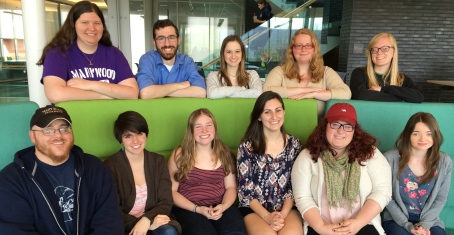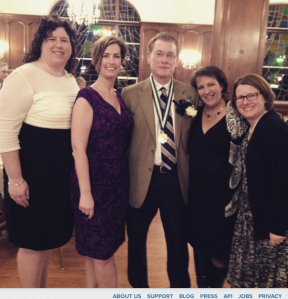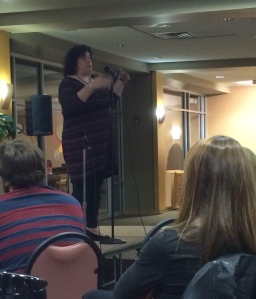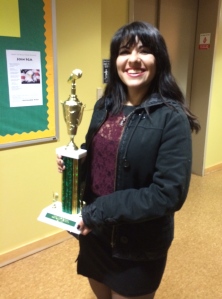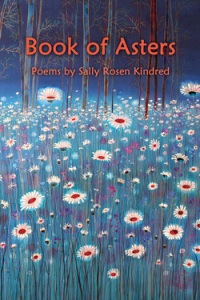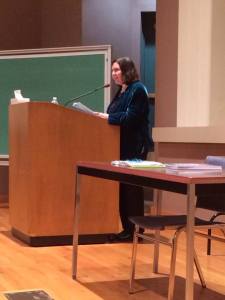Please hear the full version of these projects at the Senior Seminar Mini-Conference, Wednesday, 6 May 2015, 6:00pm in the Swartz Center at Marywood.
SESSION I
Through the Looking Glass Slipper
1. Emily Dean “Down The Rabbit Hole: How Alice: Madness Returns Subverts the Inner/Outer Associations of Alice in Wonderland”
Alice in Wonderland has been adapted several times in many different forms of media, each with their own unique spin on the original work, as well as criticism and analysis concerning the text. Alice: Madness Returns, however, is a new form of adaptation for a well-known text. As a video game, it is a radically different spin on the Alice in Wonderland story through its use of mature subject matter, complex characterization, and immersive settings. It takes the concept of a internal world/external world dichotomy present in the original text and subverts it by creating a melding of the two through use of psychological elements, and historical criticism.
2. Chelsea Epler “Bippity Boppity Feminism: The Magic of Female Representation in Media”
Many people believe that pop culture is a mind numbing experience with little relevance within the real world. Despite this popular opinion, the representation of a society within a media can offer insight into the social and economic status of its inhabitors. By using the movies Cinderella (1950) and Cinderella (2015) we can observe the alterations made due to the change in priorities and morals. Since the two works span 65 years and were created by the same Disney company, the amount of altering force behind the changes lies only within the time in which they were created.
Labeling the Ladies
1. Heather McDonald Budow “’Now our bodies are the guilty ones’: The Madonna-Whore in Contemporary American Musical Theatre”
The Madonna-Whore dichotomy is a common archetype followed in many areas of literature and art. Despite the fact that all women carry that dichotomy within themselves, the genre of American Musical Theatre has forced its female characters into fully embracing either the Madonna or Whore. The way this is portrayed is evident in the musicals Wicked and Spring Awakening.
2. Allison Ranieri “Hedwig, An Inch Too Masculine for Feminism? A (Trans) Feminist Examination of Gender”
The film Hedwig and the Angry Inch has created analytical divides amongst critics of Feminist and Transfeminist schools of thought concerning gender-identification. Although some scholars consider the film to be ultimately patriarchal, others argue that it reflects more feminist messages than misogynistic views. Regardless of the divides, most scholars have agreed that Hedwig, a partial male-to-female transsexual German rocker, is not actually a transgender individual despite being socially labeled as one by fans. Within this group of critics, many believe Hedwig’s gender-mislabeling constitutes the rejection of the film from Transfeminist and Feminist narratives. However, these criticisms have ignored the inherent acceptance of gender-ambiguity within the trans-community and consequently have reinforced the rigidness of gender-convention the film combats. Through an examination of the masculine, feminist, and gender-ambiguous features of the film, I will attempt to clarify Hedwig’s gender-identity and secure the film’s position as a text worthy of a Transfeminist and Feminist labeling.
SESSION II
Seeing & Believing
1. Patrick Kernan “’Or, at least, I think that’s what happened’: Authorial Involvement and Factual Accuracy in Journalistic Works”
Criticism of Truman Capote’s In Cold Blood, Hunter S. Thompson’s Fear and Loathing in Lost Vegas, and Jon Krakauer’s Into the Wild often centers around the problems with the texts, typically regarding the factual veracity of the texts. What has not been done regarding these texts is an examination into whether or not the author’s choices were ethical in a journalistic sense. Also, there has not been a comparison of the three texts, to show a progression from least ethical to most ethical. In addition to this, critics have not given much thought concerning how the ethicality of the texts also affects their entertainment value. In this paper, I argue that Capote’s work is least ethical because he hid his factual failings, Thompson is in the middle because he still failed but acknowledged his failings, while Krakauer is the most ethical because he uses traditional journalistic techniques. This paper examines different ideas of truth, including Capote’s and Thompson’s feeling that emotions were an important part of truth, while Krakauer uses a more objective sense of truth that focuses strictly on facts.
2. Erica Kester “Fact vs Fiction: The Misrepresentation and Glamorization of Terminal Illnesses in The Fault in Our Stars and A Walk To Remember”
Young Adult Literature has increased in popularity over the past decade. With its increasing popularity well known authors have immerged. Two of these authors are John Green and Nicholas Sparks. While their works have been well received by both literary critics and their young adult audiences, their novels that focus on cancer (The Fault In Our Stars and A Walk To Remember) have recently received some less than favorable reviews. More and more critics are now asking the question of “How far is too far?” when it comes to discussing such a heavy topic with a YA audience. This paper will explain how the glamorization and misrepresentation of terminal illnesses is affecting its YA audience and the effect it is having on the YA genre as a whole.
3. Megan McDonnell “Angels and Demons: A Cultural Comparison of Magical Realism in the Americas”
Magical realism is a genre that has been studied extensively in Latin America for its ability to blur the lines between reality and conjecture. In this way, magical realism seeks to confront perceptions of reality, an aim easily documented by research and criticism in the genre. However, there is not much research dealing with magical realism across cultures, especially as it pertains to the United States. Offering a cultural comparison of how magical realism manifests in both Latin American and American cultures provides a lens through which we can examine commonly held beliefs and views not otherwise apparent. Through a close comparison of Gabriel Garcia Marquez’s “Un senor muy viejo con unas alas enormes” and Edgar Allan Poe’s “The Black Cat,” the stark contrast between the author’s respective cultures comes into sharper relief.
Novel American Morality
1. Sr. Maria Imbori “The Power of Moral Convictions: One’s Convictions Depict Who One Is and What One Stands for”
Scholars and critics have different interpretations when discussing literary works. The novels O Pioneers! by Willa Cather (1993) and Storming Heaven by Denise Giardina (1987) have been discussed in terms of environmental concerns. O Pioneers! is also focused on a gender role and religious references. Some scholars consider Cather’s O Pioneers! as a reflection of her own life because she put her own career ahead of her personal life as Alexandra did. Storming Heaven, meanwhile, has ideas about a community working together and the struggle for social justice. In both novels the main characters have demonstrated strong commitment. Discussing these two books together helps us to see how individual characters have demonstrated their strong conviction in dealing with difficulties. As a matter of fact, our world today desperately needs models of conviction. The characters in both books provide such models. Looking at these books together helps us to understand and appreciate the work of literature.
2. Briana Galea “What Does it Mean and Why Does it Matter?: Kurt Vonnegut’s Cat’s Cradle as a reply to Mark Twain’s The Mysterious Stranger”
Previously, critics have compared Mark Twain and Kurt Vonnegut’s use of satire. In this paper, I intend to highlight the ways in which Cat’s Cradleseems to be responding to The Mysterious Stranger. In order to do this, I discuss the ways in which Cat’s Cradle and The Mysterious Stranger argue that the meaning of life is in the perpetuation of the human race. This paper offers an analysis of the intangible qualities that appear in Mark Twain’s The Mysterious Stranger and Kurt Vonnegut’s Cat’s Cradle that characterize both novels as satire. While the ideas that appear in both novels are abstract, their foundations can be found in the very real ways people interact with each other and the ways societies conduct themselves.
